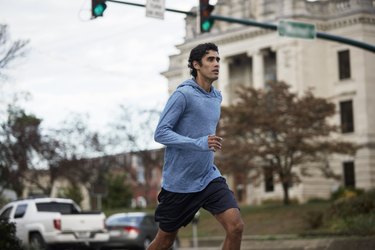
Burping while you run is not a completely controllable phenomenon. Some natural changes take place in your body as you exercise that can cause burping. Being aware of them can help set your mind at ease — so if you do burp while exercising, you don't necessarily need to worry that you have serious medical condition.
Exercising draws blood flow away from the stomach, which can impede digestion. When this happens, key hormones increase production to move food through the intestinal tract faster than normal and help produce gas. Additionally, the jarring of your stomach during exercise, like running, can also produce gas, which can cause burping.
Video of the Day
Video of the Day
Read on to find out more answers to the question: "Why do I burp when I run?"
1. You're Swallowing Too Much Air
There are two ways you can breathe, according to the American Lung Association: through your nose and through your mouth. Breathing through your mouth occurs more during exercise and so swallowing the air that causes you to burp is not uncommon. Swallowing air is so ordinary it even has a scientific name: aerophagia.
Taking air into your esophagus while running is not unusual. Even more common is swallowing air while drinking, according to the Mayo Clinic. For many people, the amount of water competes closely with the amount of air ingested into your stomach. Combining fluid intake while running creates a perfect storm for burping.
Rapid, erratic breathing can cause you to swallow too much air as well. This can happen if you're running too fast and your breaths become uneven.
Fix It
To help prevent swallowing too much air and burping, take your time hydrating during your run. While it's tempting to guzzle down your water or sports drink, being mindful of the speed at which you're drinking can help keep your belching at bay, according to the Mayo Clinic.
Additionally, focus on your breathing while exercising to avoid burping, keeping it slow and even to avoid taking big gulps of air. If you can't talk and hold a conversation while you're exercising, you're working too hard.
2. Your Body Can't Break Down Certain Foods
The food you eat is the next most significant cause of burping while running. You can experience gas when your digestive system can't break down food components like the gluten in grains or the sugar in dairy products and fruit, per the Mayo Clinic. This gas can then gets burped up during strenuous activity.
High-fiber food, beans, fructose and sucrose found in candy and soft drinks can also contribute to excessive burping while exercising.
Fix It
Everyone tolerates certain foods differently, so it's important to experiment with pre-run snacks to see what works for you. With that being said, easily digestible carbs, like bananas, crackers, cereal, applesauce, pretzels or white bread are ideal to eat before a run, according to Johns Hopkins Medicine.
If you're not sure what foods may be causing your problem, consider talking with a registered dietitian (RD) to come up with a nutrition plan that's right for you. (Check out the Academy of Nutrition and Dietetics database to find an RD based on their specialty, location, language or insurance and payment options.)
3. You Have GERD or Silent Acid Reflux
Here are two terms that might be cause for your burping while working out: GERD and silent acid reflux. GERD, short for gastroesophageal reflux disease, happens when a muscle at the end of your esophagus doesn't close as it should and the contents of your stomach could push back up your esophagus, per the Mayo Clinic.
Silent acid reflux, or laryngopharyngeal reflux, occurs when your stomach acid flows back up your esophagus into your larynx and throat, according to UT Southwestern Medical Center. This condition is often referred to as "silent acid reflux" due to lack of symptoms in your chest.
When you run too soon after eating, acid could be thrown back up your throat. Both conditions cause increased swallowing, which in turn can cause excessive burping, according to the Mayo Clinic.
Fix It
Wait a few hours between eating and exercising, according to the Mayo Clinic. If you've just eaten a large meal, don't go for a run until 3 to 4 hours later. If you've just eaten a smaller meal or snack, it's recommended to wait 1 to 3 hours before working out.
If your GERD or silent acid reflux is chronic and affecting your day-to-day life, make an appointment with your doctor for a personalized treatment plan. (If you can't afford health care, you can find low-cost options in your community through HealthCare.gov.)
Warning
If you've tried the above advice and your burping during exercise doesn't go away (or burping after exercise continues), or if you have other symptoms such as abdominal pain, blood in your stool, heartburn, acid reflux or bloating when not exercising, talk to your doctor.
You may have a gastrointestinal problem that is causing the burping and other symptoms, according to the Cleveland Clinic. Often, lifestyle changes can make a difference. But in some cases, medication or surgical procedures may be necessary.
- Mayo Clinic: "Belching, Intestinal Gas and Bloating: Tips for Reducing Them"
- American Lung Association: "Five Ways You Might Be Breathing Wrong"
- Mount Sinai: "Why Do I Get a Sore Throat When I Exercise?"
- MedlinePlus: "GERD"
- Mayo Clinic: "Gastroesophageal reflux disease (GERD)"
- UT Southwestern Medical Center: "Silent Reflux"
- Mayo Clinic: "Eating and exercise: 5 tips to maximize your workouts"
- Johns Hopkins Medicine: "Runner's Diet"
- Cleveland Clinic: "Gastrointestinal Diseases"
- Avoiding Exercise-Related Gastrointestinal Distress